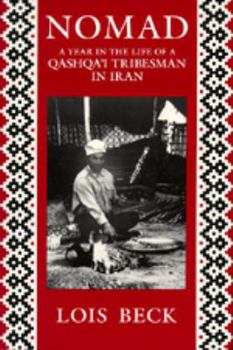Nomad: A Year in the Life of a Qashqa'i Tribesman in Iran
Select Format
Select Condition 
Book Overview
Borzu Qermezi was the headman and political leader of a group of nomadic pastoralists who were part of the Qashqa'i confederacy of southwest Iran. Proud, complex, strong-willed, witty, and cunning, Borzu successfully led his people on their annual migrations for many years. He regulated their travel; mediated conflicts; intervened in (and sometimes exacerbated) tense situations between his people and other nomads; and dealt with the government police agency. Structuring the account around the four seasons, Lois Beck recounts the day-to-day activities of Borzu during the year she spent traveling with his people. She describes the rigors of nomadic life and the consequences of decisions made in haste. During 1970 to 1971, Borzu and his people were faced with many difficulties. When the expected winter rains did not fall, pastures and crops shriveled. Unable to sell their starving livestock for any profit, Borzu's people saw their debts to urban merchants and moneylenders increase. At the same time, Iran exercised more bureaucratic control over the Qashqa'i by applying new policies over migratory schedules and the allocation of scarce pastures, and by introducing non-Qashqa'i agriculturalists and livestock investors as legitimate land users. All these measures threatened the nomad's way of life and eventually undermined the role of headmen such as Borzu. Lois Beck details the vicissitudes endured by Borzu's people and the strategies he devised to cope with them. Blending ethnographic and historical material, this book contains information unavailable for other tribal and nomadic pastoral groups in the Middle East and central Asia. Through Beck's deft analysis, we come to understand why nomadic pastoralism was once an important part of this vast region, and why tribal society has endured.
Format:Paperback
Language:English
ISBN:0520074955
ISBN13:9780520074958
Release Date:December 1991
Publisher:University of California Press
Length:482 Pages
Weight:1.80 lbs.
Dimensions:1.3" x 6.0" x 9.0"
Related Subjects
Cultural History Iran Middle East Politics & Social Sciences Social Science Social SciencesCustomer Reviews
1 rating
Nomad - Borzu and his family's story
Published by Thriftbooks.com User , 16 years ago
This is one of those unforgettable books, that mark one, and that 50 years on, one will still remember. Such was the impact of Lois Beck's study of the Qashqa'i tribesmen, and in particular one headman and his family, struggling to maintain their ancient way of life in increasingly difficult and antagonistic circumstances. Transhumance (or this particular sort of seasonal human & livestock migration) has been a way of life going back to pre-historic times. Half way through this thick book, I felt passionately absorbed and involved with the minutiae of Borzu's family's life, angry with the ethnic Iranians (authorities and civilians who did nothing to protect or help these people but on the contrary encroached increasingly on the Qashqa'i's lands, enslaved them with debt, and perpetrated other injustices). This book highlights above all the great need to protect and nurture ethnic minorities, against the encroachments of majority ethnic groups, and to constantly re-assess changing needs and developments in situ. Lois Beck has done the Qashqa'i an immeasurably great service. I salute her scholarship, her great compassion, and amazing ability to bring alive what is to most of us a very remote way of life. I hope this book was read widely in Iran and by the authorities there.





